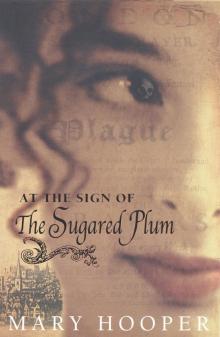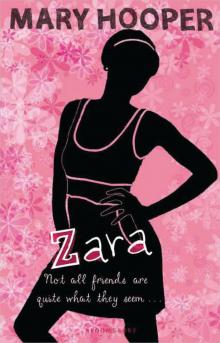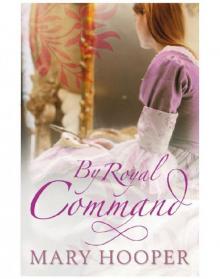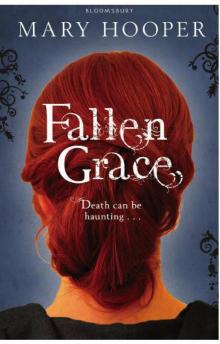- Home
- Mary Hooper
Fallen Grace Page 3
Fallen Grace Read online
Page 3
‘Pity,’ said Mr Morrell. ‘Still, it weren’t going to be worth more than a few pennies anyways.’
Lily’s bottom lip trembled. ‘Is there nothing that can . . . be . . . done?’
‘Got any more like it at ’ome?’ asked Morrell cheerfully.
Lily shook her head. How had that happened? Perhaps she hadn’t been careful enough; Grace sometimes said she was clumsy. Now the teapot, their mother’s precious teapot, was gone for ever. And soon Grace would be home and there would be nothing to eat and no clothes for the baby either.
Lily turned away and trudged home, too traumatised to cry, while Mr Morrell and Ernie the candlestub seller admired the Meissen teapot, safe on the secret shelf below the pawnbroker’s counter.
x
Chapter Four
‘The great garden of sleep,’ Grace murmured to herself, reading the notice on the station platform. Then she added, ‘My baby will be safe with Miss Susannah Solent in the great garden of sleep.’ Said like that, it was almost bearable. As if those who’d died were merely resting themselves in the ground until a spring when they would all rise up again, which Grace knew she was supposed to believe but could not quite manage to.
The train drew into the station amid billows of steam and, as it came to a standstill, the top-hatted representatives of the funeral companies disembarked and made ready, with many obsequious bows, to guide the bereaved families to the allotted burial places of their loved ones. As the mourners grouped and regrouped themselves ready for the final stage of their journeys, Grace drew a little closer to the van which held the coffins. Out of public view, these were now being nailed down (this little ceremony being left as late as possible to guard against anyone being buried before they had breathed their last), following which the van’s doors were opened and the coffins removed. Most of the first-grade funerals had their own individual hearses waiting, with a priest or black-clad mute to lead the way, while the pauper burials made use of a handcart and the willing labour of any friends and family who could afford the train ticket out of London. The poor were glad to give their custom to Brookwood because its many acres ensured that, although the pauper funeral service would be a communal one, there was space enough for everyone to have individual burial plots; the bodies would not be tumbled together in a pit as they would have been in London.
When the coffins were moved out of the hearse van, Grace, viewing it from some way off, knew exactly which one was Susannah Solent’s – the pale oak casket in the final section. She watched it being taken out and placed on to the shoulders of the undertakers’ men, then slid gently into the waiting glass-topped hearse, where it lay shrouded in white flowers. Keeping at a safe distance, she followed the black-plumed horses on their slow journey through the trees and shrubs, wanting to know exactly where it was to be buried so that later, if she ever was in possession of enough money for the journey, she could come and pay her respects.
There were about twenty mourners walking behind the cortège for Miss Solent, and of these only one was a woman, and she was so wrapped and shrouded in veils and black crêpe that very little about her could be discerned. Was it Miss Solent’s mother? Her sister, her aunt, a great friend? There was no way of telling.
The procession halted. Miss Solent’s grave was to be in a cleared space behind a row of newly planted cedars – so newly planted, in fact, that until the arrival of that morning’s train the gardeners had still been digging there. On hearing the train arrive, they had moved off quickly so as not to compromise the privacy of the mourners but had left a heavy fork in the ground. Grace tripped on this, hurt her ankle and couldn’t help crying out, but only one of the nearby mourners heard her, the rest being intent on the priest’s words and their own sorrow.
Mr James Solent, standing at the back of the group of people around his sister’s grave, thought the noise must have been made by a woodland animal caught in a trap, and it was only when he turned and looked through the undergrowth that he saw a girl slowly getting to her feet. He couldn’t see her face, but she appeared very young, with loose curly hair (for her shawl had slipped off her head) the colour of the crisp beech leaves underfoot. He hesitated a moment, then silently removed himself from the funeral service to see if he could do anything to help. His sister, he knew, would not have minded him doing such a thing and would certainly have done the same if their positions had been reversed.
Grace saw him coming towards her and thought of running away, but then realised she lacked both the spirit and energy. Besides, she told herself, no one knew why she was at the cemetery or what she’d done; she’d paid her fare and had as much right to be there as all the other mourners.
‘Can I help? Are you injured?’ James spoke to her as gently as possible, thinking that she might take fright and bolt if he were too direct or too loud. She looked to be about thirteen, he thought, and was pale with a tragic and beautiful face. Her clothes, although deeply unfashionable, looked as if they’d once been of good quality, but he could see they were darned, patched and almost worn through in parts.
Grace sat down on a mossy bank, feeling as weak as a kitten. ‘It’s nothing, sir, I thank you. I merely tripped on that fork.’
‘But you’re hurt!’ James protested.
Grace shook her head, covering her ankle carefully. ‘The injury is slight. It was my own fault.’
‘I say it was the fault of the Brookwood gardeners!’ James said. ‘But show me your ankle.’
‘It hardly hurts at all,’ Grace protested, tucking her skirts so that they went right over her feet and hid her shabby shoes from him. ‘I . . . I just want to sit here a little while and recover myself.’
‘Then may I sit beside you?’ James asked. ‘For I’ve heard enough today about the vale of death, the wrath of God and the land of everlasting sleep, and ’twas not at all what my sister was about. Besides, I do not want to be there the moment when her coffin is lowered into the ground.’
‘No.’ Grace shook her head, for she’d not wanted to see those last moments either. ‘It’s your sister being buried today?’ she asked timidly.
James nodded and sat down beside her. ‘Susannah.’ He sighed. ‘She was a merry girl, always laughing – that’s how I want to remember her. But look at all this!’ He indicated the gloomy scene of black-cloaked mutes and top-hatted mourners before them. ‘All these plumes and pall-bearers, feathermen and coachmen! All the talk of hearses and horses and how long we should wear mourning clothes – that is not Susannah! My father seeks to build an Egyptian mausoleum over her body and have an eternal flame burning, but none of that will bring her back.’
They were both silent for a while, then James said, ‘But I do beg your pardon. Are you here for a funeral, too?’
Grace shook her head. ‘I merely came to tend my . . . my mother’s grave.’
‘That’s sad. But ’tis a beautiful place for her to be at rest. The statuary is very fine.’
Grace nodded in agreement, for already she’d seen tombs with wonderful marble angels and cherubs, stone anchors for old sailing men, a fine riderless horse for a dead jockey and even a grand piano on the tomb of a musician.
‘My father intends to have himself and my mother interred in the Egyptian tomb in due course, and then myself and my brothers.’ He paused. ‘But if it doesn’t grieve you too much to speak of it, tell me when your mother passed away.’
‘A long while back – near ten years,’ Grace said, speaking truthfully now.
‘But you still have a father to care for you?’
Grace shook her head. ‘Our father died some years before Mama,’ she said, for this was what she believed, although Lily still thought what Mama had always told them: that Papa had gone off to seek his fortune and would return one day.
‘So you are an orphan?’
‘Yes, sir.’ Grace felt rather shy speaking to him, for although she had conversed with young gentlemen before, it had only ever been to ask them to buy cresses from her. ‘I live with my
sister and we survive quite well,’ she went on, not wanting him to think she was destitute.
‘But how did you manage after your mother died? You must have been scarce more than babes in arms.’
‘I was about five and my sister was six,’ Grace said. ‘We were taken into an orphanage which was run by a kindly woman and we were quite happy there.’
‘And then . . . ?’
‘Then when I was fourteen we were taken to a training establishment, where I was to learn to be a teacher.’
He looked at her closely. ‘I can see by your face that you didn’t care for it there.’
Grace felt a fluttering of panic, but tried to speak calmly. ‘I did not, sir. And so we decided to leave.’
‘When was this?’
‘We left near a year ago. And since then we have been fending for ourselves and . . . and doing quite well. We sell watercresses on the streets.’
He nodded. ‘And as your sister is older than you, at least she is able to provide you with some of a mother’s attentions.’
Grace inclined her head. There was no reason to tell him that Lily was, in fact, only older than her if you counted the years; that actually it was the other way round, Lily would need her care and attention for the rest of her life and could never manage on her own.
As the nearby funeral service neared its conclusion and the group at Miss Solent’s graveside gave their responses to the priest, James got to his feet, saying he must join them. He reached into the inside pocket of his coat as he bade her farewell and Grace froze with shame, thinking he was going to offer her money, but he did not.
‘I’m a lawyer’s clerk at Lincoln’s Inn,’ he said, handing over a business card. ‘If at any time I can assist you, do please call into the office and ask for me.’
Grace could not think of any possible circumstances where she might need his guidance, but she took the card, which read:
‘I can see by your face that you wouldn’t ever presume upon me, but if I can help you at all, please allow me to do it for my sister’s sake.’ He smiled a little sadly. ‘Susannah was a great girl for helping young ladies in distress, you know. Who’s to say that she didn’t somehow contrive that we should meet here at her funeral?’
Grace smiled. ‘It’s a pretty thought,’ she said. She got to her feet, tested her ankle and found it quite pain-free. ‘Thank you for your attentions,’ she said, ‘and may I wish you as good a day as possible.’
‘Until we meet again,’ said James, giving a slight bow.
The Necropolis train did not leave Brookwood until after three o’clock in the afternoon, so Grace went into the small chapel and, making herself as inconspicuous as possible in the back row, thought of all that had happened to her over the last few days, endeavouring to make sense of it. Occasionally – for she was extremely weary – she found herself drifting off to sleep, but when she did she had a frightening recurring dream that the baby was still inside her and she was running hither and thither looking for somewhere safe to give birth to it.
When half past two struck (and her life made no more sense to her than it previously had), she decided to join the train ready for the return journey. Reaching the little station and discovering that the engine was not yet in position, however, she waited with the mourners as they spilled out from the refreshment rooms on to the platform.
From a young age Grace had studied people, and this had come in useful since going into the watercress-selling business, for she’d quickly learned who might be best approached in order to achieve a sale, and who would be a waste of time. Looking at the top-hatted funeral directors shepherding their flocks of mourners, she could not help noticing that one set of undertakers seemed more assertive than the others. They were more voluble in their condolences to the bereaved; more solicitous in their care; ever ready with an extra shawl or black-edged handkerchief; patting, comforting, cosseting and mopping tears; speaking to the bereaved families of a ‘good death’ and ‘the solace of a fine funeral’.
This was Grace’s first encounter with the Unwins.
Mr George Unwin owned the largest firm of undertakers in London and was willing – one might even say eager – to supply bereaved families with their every funereal need. At the Unwin Undertaking Establishment one could choose from twenty-nine different coffins, all with interchangeable silk interiors and a choice of brass or silver coffin furniture. They could provide glass carriages pulled by black-plumed horses, velvet palls, mourning bands, streamers, staves, funeral wreaths and mutes wearing any amount of black crêpe. The only thing they could not provide was mourning wear, but fortunately every variety of this nature of garment, plus veils, bags, gloves, stoles and all the other trappings of the first, second and third bereavement periods, could be purchased at the largest mourning warehouse in Oxford Street, the Unwin Mourning Emporium, owned by Mr George Unwin’s cousin, Mr Sylvester Unwin.
Mrs Emmeline Unwin, wife of George, saw Grace standing still and silent on the station platform with, apparently, no family to support her. Mrs Unwin was an unusual but inspired addition to a modern undertaker’s business, for her sole purpose at a funeral was to comfort those of the female sex who were overtaken by their emotions. She was tall and thin, with a sallow face, small eyes and a smile which showed as much gum as teeth. She nearly always wore black in order to empathise more fully with her clients, and had a score or more fashionable outfits complete with matching hats and veiling. It was her mission to persuade the bereaved that wearing the latest in mourning wear was not so much an expense as a tribute to the departed, and now, wearing the most fashionable crinoline-skirted gown supported by a cage that rocked from side to side, she glided smoothly towards Grace.
‘My dearest girl, are you all right?’ she asked softly, laying a hand on her arm. At close contact, however, she noticed the shabbiness of Grace’s garments and, realising that there was no money to be earned by recommending a marble monument to soothe her saddest hour, immediately saw a different sort of opportunity. ‘Dear child, you appear utterly devastated!’
Grace, even though weary, dropped a small curtsey. ‘I thank you, but I am bearing up quite well.’
‘You have such a soulful face!’ Mrs Unwin lowered her voice. ‘Have you ever thought of going into the undertaking business as a mute?’
Grace looked at her, startled. She wanted to shake off the woman’s hand, but knew that to do so would be very rude.
‘You may think it indelicate of me to speak of such a thing, but I must tell you that I believe you would be perfect for a position as a professional mourner.’
Grace still didn’t reply, so surprised was she.
‘You’re young, yet look as if you have witnessed all the sadnesses of the world. You would make the most marvellous mute!’ Grace not denying this, the woman went on, ‘The funeral business is expanding, dear. We always need faces such as yours. You could come and live with us, become part of the Unwin family.’
Grace shook her head. ‘I’m sorry, but . . .’
‘You’d be paid five shillings per funeral, and when you weren’t working as a mute you could help the girls in the sewing room with the coffin interiors. With a tragic face like yours, you’d be very much in demand at high-class funerals.’
Grace shuddered a little at the thought. ‘I’m sorry,’ she said again. ‘I live with my sister and couldn’t think of leaving her on her own. And I think I would find being a funeral mute too miserable a life.’
‘But ’tis a wonderful thing to bring solace to others!’ Mrs Unwin cried. ‘If we can, it is our Christian duty to do it.’
Grace shook her head once more. ‘I could not, but thank you for thinking of me.’
‘As you wish,’ Mrs Unwin said. She pulled a card from her black velvet muff. ‘But if you ever change your mind . . .’
Grace took the card and curtseyed her thanks, thinking how strange it was that she had never even held a business card in her hand before, but had now been given two in one day. This o
ne was black-edged, like a mourning card, and upon it were engraved the following words:
The blue and black train appeared out of its siding at last and, steaming copiously, drew level with the platform. Mrs Unwin glided off, veils ashake, while Grace climbed into one of the third-class carriages, sat down and forgot her immediately.
The train shunted forward and fell into a rhythm. Sighing with relief that everything had gone just as the midwife had instructed, Grace closed her eyes, willing the train onward so she could get home to Lily. Oh, she hoped her sister had been managing all right without her . . .
x
Chapter Five
The lodgers at Mrs Macready’s house were a disparate bunch. The top floor comprised a fairly large area divided by a thin board wall, with a married couple on each side of it. Both the men were costermongers with street stalls; their wives worked alongside them. One couple sold cheap fish – herrings, sprats and whelks – the other specialised in apples or potatoes according to season. If they ever had rotting or substandard stock on their hands then they’d share it amongst Mrs Macready’s lodgers, all of whom were always more than happy to take it.
One flight down from the costers, on the third floor, lived Mr Galbraith, who came and went at strange times in the night, usually in full evening dress, while in the room next to his were the Cartwrights, an Irish family with a brood of seven or eight noisy children. The Cartwrights worked as match sellers, pickers-up of cigar ends, errand runners, and the youngest, a boy aged two, as a decoy. He would attract attention by ‘getting lost’ while his older sister picked the pockets of those sympathetic souls who stopped to help him. Grace and Lily were on the second floor in a small room next to a frail old couple, Mr and Mrs Beale, who were both nearly blind and went out selling bootlaces in order to keep from being parted in a workhouse. They suffered dreadfully from living just underneath the noisy Cartwrights, who were in and out at all hours.

 At the Sign of the Sugared Plum
At the Sign of the Sugared Plum Zara
Zara Megan 3
Megan 3 Holly
Holly By Royal Command
By Royal Command Newes from the Dead
Newes from the Dead Amy
Amy Poppy in the Field
Poppy in the Field Poppy
Poppy Velvet
Velvet At the House of the Magician
At the House of the Magician The Remarkable Life and Times of Eliza Rose
The Remarkable Life and Times of Eliza Rose Chelsea and Astra
Chelsea and Astra The Betrayal
The Betrayal The Disgrace of Kitty Grey
The Disgrace of Kitty Grey Fallen Grace
Fallen Grace